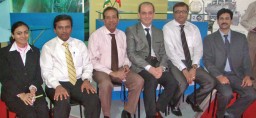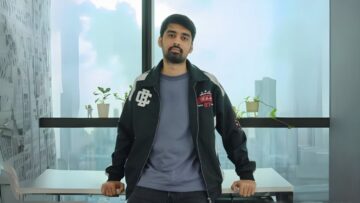
While India has been a traditional hub for textiles for centuries, processing remains a week link… no wonder the country has seen an influx of international companies marketing processing machinery to the industry. Among them DMS Dilmenler from Turkey has already established its strong presence in Tirupur with a number of companies using processing machines manufactured by Dilmenler. Now the focus of the company is to enter the north of India with Mumbai-based Imperial as its partners. “We have already proved our mettle with knitted fabrics and now we are looking to support processing in woven fabrics,” says Ismail Sengueler, Sales Director, Dilmenler.
The company has specialized lines for dyeing (piece, yarn and beam dyeing), open width slitting and squeezing machines, single or double pass jumbo air relax dryers with or without egalizing section attached, stenter for drying and heat setting and open width compacting machines. “Our quality is near to the European machines, while the prices are in tune with Asian requirements,” says Ismail. He is quick to point that that they have positioned their machines as middle level technology which is light on the pocket, but has all the features that spell quality performance.
India is an important market for Dilmenler and the potential of the market is not hidden from the company. “Turkey has always had a strong processing culture, but it is only since recently that Indian mills are looking to invest in world quality technology for processing and as a huge country with many textile clusters the scope for growth is immense,” avers Ismail. While the need for technology in processing is huge, the understanding of what to invest in according to individual needs is very limited according to Ismail. “Units are very open to investment, but with so many options in the market they are not sure what to buy,” he says.
So what differentiates Dilmenler machines from other competitive processing solutions in the market today… According to Ismail Dilmenler can guarantee consistency in output and quality batch after batch, which is a major concern in processing. Further, since the machine is automated there is less people intervention ensuring that the chances of human error is minimized. Finally, Ismail claims that Dilmenler machines require less maintenance and run continuously without breakdowns for longer period of time than other machines. “Processing is a 24X7 business and it is important that the machine can withstand long working hours,” reasons Ismail.
What the company is looking to promote is mostly the dyeing machines and the stenters. The stenter from Dilmenler is functionally and ergonomically designed to save energy and operating cost. The same machine is workable for knits and woven with few alterations. Further customized solutions are offered for treatment, coating and technical textiles.
Confident that Dilmenler machines have all the qualities that are required for quality results Ismail says, “We are a 25-year-old company with presence in India for the past 15 years and our machines are running successfully in Indian conditions, our strong credibility of past performance is enough proof that our machines are delivering.” In fact the service station in Tirupur is self-sufficient and the technicians and management from Turkey only visit the centre for training and regular updates.
“The technicians there are so well trained that now they can handle installations by themselves,” avers Ismail.
This level of expertise has been achieved by giving training to each team member in Turkey and they further train the factory staff on how to handle the machines. In the north, all after-sales will be handled by the team of technicians at Imperial, who again have been trained by Dilmenler. “We are very happy to associate with the Imperial Group and with their penetration in this market we are confident that we will find similar success as in Tirupur,” says Ismail. The company is open to offering services beyond the machines and they provide tips on the best way to achieve desired results.
Looking at growth from India Ismail concludes, “For us India is the biggest market and though China is big in textiles, they are not as open to technology as Indians are and we have a comfort level with India that smoothly translates into business.”






